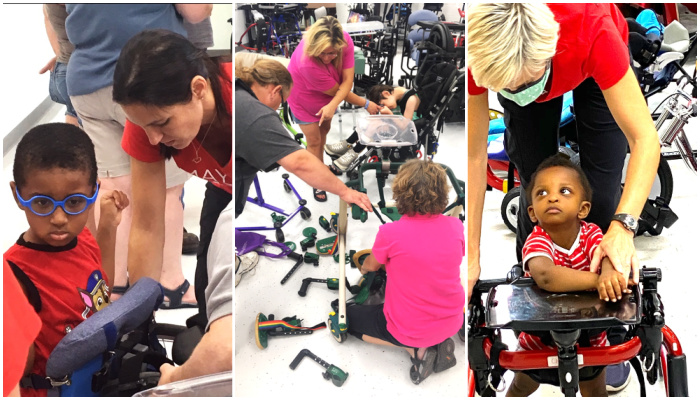The Cruelty of Strangers: Responding to Rude Comments as a Special Needs Parent

So you have just had a baby! Well done!
She is beautiful, healthy, just what you had hoped for—but she cannot see. This is very clear, very quickly.
In our case she had the most beautiful white hair, clear blue eyes with nystagmus, and no focus. It was apparent that she did not “fix” her vision on objects, not even people, and her affect was quite flat; even wind did not get her smiling.
But she was beautiful! And it was 2004—how bad could it be that she had albinism?
“A Poor Wee Soul”
She was still being looked after in NICU the first time someone felt it was reasonable to refer to my daughter as “a poor wee soul.” And it was a nurse that said this.
Understandably,I looked again in case the nurse could see something I could not—nope,this was a robust healthy child, the child I had longed for. Granted, she could not see and had albinism, she was also a bit small because she was early (32 weeks, 4 lb 13 oz), but the consultant obstetrician said “she looks like a tiny full term baby.”
I felt it would be inadvisable to take issue with the nurse, so the next time she said it, I agreed. But what had she seen in my child that made this baby the object of her pity? I had no idea; I let it go, thinking that if I did not recognize my child in this description, it was because the description did not fit.
I feel now that I was wrong; not about the need for her pity, but that I should have shown the nurse what I could see.
Fast Forward a Few Months…
Now I have a happy healthy thriving baby who has her own basic personality and deals with the world on her own terms. She still has white hair, nystagmus, and by now she is registered blind. By this point I could write a book on albinism but I am far too busy.
People approach us outside, in the first instance because she is a baby and that’s what people do. They stay to interact with her because of her hair; she is a platinum bombshell, everyone wants to comment, to touch, to talk to her.
I know they can see what I can see, that her gaze has no focus, that her eyes wobble, that she has albinism but, of course, this is just a tiny baby. No one would dream of pointing these things out to her mother, people are far too understanding, essentially polite, basically decent.
I’m right; don’t you think?
You would have to be an excuse of a person to point out the problems this child has. Verbally. To her mother. In public. A complete stranger.
That just would not happen.
The Real World
If you are the parent of a disabled child you know this does happen. Every day. With monotonous regularity people go to considerable lengths to make sure I know this child is different.
The hardest time for me was when I was changing my expectations of what my child would be able to do. This coincided with a brief period when I thought it was my duty to remain polite and instructional to the world at large.
 As an infant, my daughter heard me telling strangers at checkouts about odds on genetic variables (I blush to think of it). She heard me explain to people I had never met before and will never meet again, I hope, about genetics, melanin, and brain structure.
As an infant, my daughter heard me telling strangers at checkouts about odds on genetic variables (I blush to think of it). She heard me explain to people I had never met before and will never meet again, I hope, about genetics, melanin, and brain structure.
May I forever lose the power of speech if I ever again thank someone who has just used my daughter to explain albinism to her disinterested son, and finished it off with “she’ll be just fine.” (I think that particular mother was a doctor.)
A friend’s child had to wear a medical helmet for a considerable time and almost weeps to remember being followed round a supermarket by a woman saying to her husband, “Hurry, you’ll miss this wee girl. You’ve got to see this.”
As though the circus had quietly come into town and they were missing it!
I think each of us has a harrowing story to tell about the cruelty of strangers (the cruelty of family being a whole other subject!). How can loving parents deal with this well?
All families and situations are different, but here is my advice based on the considered results of my experience:
-
- Let them say what they want to say.
It has been my experience that they will anyway.
- Let them say what they want to say.
-
- If you think they are wrong DO NOT AGREE WITH THEM.
You will not forgive yourself later. It is easier to demur politely than to ignore someone, but that works too.
- If you think they are wrong DO NOT AGREE WITH THEM.
-
- Pretending not to see what they can see has always appealed to me in a nasty way.
You can say, “Oh my God, you think there’s something wrong with my baby’s eyesight? Somebody get a doctor!”
- Pretending not to see what they can see has always appealed to me in a nasty way.
-
- If you genuinely feel like it, explain what the causes or reasons are but always within your own comfort levels. It is really none of their business.
-
- Always remember your child can hear you.
Even if you think your child will not understand what you are saying, you can be sure she will know that it is about her.
- Always remember your child can hear you.
-
- Find a form of words that will work for your child too.
Your child will be dealing with this long after you’ve finished escorting them on every journey. Phrases like, “She doesn’t see very well,” work for me. It explains but not in detail and it lets your child have a ready answer for adults who should know better.
- Find a form of words that will work for your child too.
-
- Be reasonable with children.
The very few times another child has made enquiries about my daughter’s condition,I have found that it stems from a genuine desire to understand. I’m always happy to give them an explanation, but I try to tailor it to their understanding.
- Be reasonable with children.
-
- In the last resort, defend your ground.
If you feel that someone has been too rude, too forceful with their opinions, or discriminating towards your child, do not tolerate it. If you do, in twenty years time you will still be castigating yourself, so cut yourself some slack and say what you think. You’ll feel the better for it.
- In the last resort, defend your ground.
Being seen as different is a very hard thing to come to terms with about anyone you love; and when it comes to your child it is so much more difficult to rationalize. Why are so many people so rude when it comes to disabled children?
I think it may have to do with the current climate of “inclusion,” where there are no “homes for the blind” and children grow and, hopefully, thrive in ordinary communities. Previously, the parents of blind children were strongly encouraged to institutionalize their children, so these kids did not grow up integrated within their own community.
Children were essentially excluded and this barbarism has only stopped recently. This means that ordinary folk going about their ordinary business did not have to see, interact with, and just accept the normal variations within any community.
So, as communities, people did not find ways to accommodate these kids, or ways to speak intelligently with their parents. They didn’t need to. Circumstances have changed, but as a society people are still catching up. They may not have a reasonable way to speak to the parents of these kids because they have never heard anyone else have that kind of conversation.
Some people are essentially not very socially aware, presumably they do not know that a single negative comment can be devastating to a new mother. The best advice I have ever been given is this:
It is working for me.
Read this article in Arabic: قسوة-الأغراب

Related Posts

Assistive Technology, Support
May We Help: Engineering Independence for People with Disabilities
May We Help is dedicated to designing and building custom solutions that help individuals of all ages achieve mobility, access, and independence, all at no cost.

Special Needs, Support
Five Steps to Finding Joy: Faith and the Journey of Parenting with Special Needs
Through faith special needs parents can learn to cultivate a deep, enduring state of joy.

Special Needs, Support
How Do You Keep Faith Alive When Your Child Remains Ill?
I understand the emotional toll of chronic illness, but I also believe in the power of faith and community to uplift and sustain us.